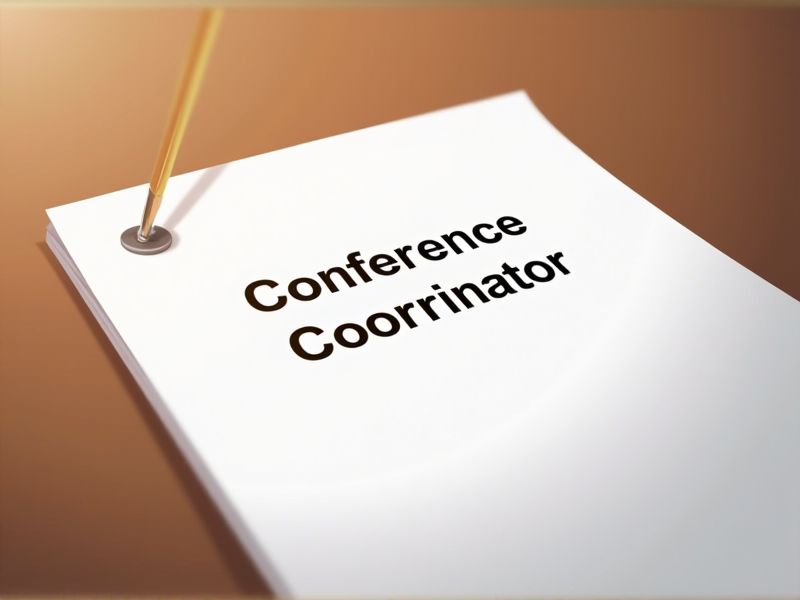
Conference coordinators play a pivotal role in ensuring seamless event execution, and certain certifications equip them with essential skills. Possessing specialized credentials can enhance their ability to manage logistics, vendor interactions, and complex schedules. Certifications provide validation of a coordinator's expertise, making them more attractive to potential employers or clients. Important certifications that can benefit a Conference Coordinator include CMP, CMM, and DES.
Certified Meeting Professional (CMP)
Obtaining a Certified Meeting Professional (CMP) designation enhances a conference coordinator's credibility, signaling a high level of expertise and commitment to the industry. The rigorous preparation process for the CMP equips coordinators with advanced skills in strategic planning, stakeholder management, and event execution. CMP-certified coordinators often witness increased trust from clients and employers, resulting in greater job opportunities and career advancement. Studies have shown that those holding a CMP certification tend to secure higher salaries compared to their non-certified peers.
Certified Special Events Professional (CSEP)
Possessing a Certified Special Events Professional (CSEP) credential can significantly boost a conference coordinator's credibility and trustworthiness. The rigorous CSEP certification process equips individuals with advanced skills in organizing and managing high-stakes events, ensuring they are well-prepared for complex scenarios. Clients and employers often perceive CSEP-holders as more competent, leading to increased job opportunities and career advancement. The network stemming from CSEP certification provides access to industry best practices and insights that enhance conference execution quality.
Certified Government Meeting Professional (CGMP)
The CGMP certification provides conference coordinators with specialized knowledge of government meeting regulations, ensuring they effectively navigate complex federal guidelines. This credential helps coordinators build a strong reputation for reliability, offering clients assurance of compliance with government standards. Conference coordinators with CGMP expertise can mitigate risks associated with legal and financial stipulations, thus avoiding costly penalties. The credential also enhances their marketability, opening doors to more opportunities and potentially leading to career advancement in the government sector.
Meeting Management Certificate (MMC)
Conference Coordinators often juggle multiple tasks, and obtaining a Meeting Management Certificate (MMC) can help improve their organizational skills. Possessing an MMC demonstrates a validated proficiency in handling complex logistics and planning requirements. With an MMC, coordinators are better equipped to manage budgets effectively and ensure accurate resource allocation. Earning this certification can enhance a coordinator's credibility and make them more attractive candidates in a competitive job market.
Project Management Professional (PMP)
Conference coordinators handle complex logistics, and a PMP certification equips them with essential skills in managing project timelines, budgeting, and resource allocation, directly impacting the conference's efficiency and success. The structured approach offered by PMP training aids coordinators in risk management and problem-solving, reducing chances of unforeseen disruptions during events. Client expectations are high in conference planning; a PMP-certified coordinator can communicate effectively, ensuring clear alignment and delivery on objectives. Given the collaborative nature of conferences, PMP credentials ensure coordinators possess the leadership tools necessary to guide diverse teams towards a common goal.
Certified Administrative Professional (CAP)
A Certified Administrative Professional (CAP) credential enhances a conference coordinator's organizational skills, which ensures events are structured and efficient. Understanding best practices in administration through CAP training directly improves logistical planning and execution, leading to smoother conferences. The credential often increases credibility among peers and stakeholders, fostering trust and confidence in the coordinator's capabilities. CAP certification demonstrates a commitment to professional development, equipping coordinators with current industry knowledge and skills, which can result in higher job performance and career advancement opportunities.
Digital Event Strategist (DES)
A Digital Event Strategist (DES) optimizes the virtual component of conferences, ensuring seamless integration with in-person experiences. Their expertise in digital platforms enhances attendee engagement through interactive tools and personalized content. DES professionals provide data-driven insights that help Conference Coordinators improve future events. By managing technical aspects, they allow the Coordinator to focus on overarching conference logistics.
Certificate in Meeting Excellence (CME)
Certification in Meeting Excellence (CME) provides essential skills in event planning and management which enhances a conference coordinator's ability to execute successful events. Expertise from CME leads to improved logistical planning, which reduces errors and increases attendee satisfaction. The program's focus on communication and negotiation strengthens the coordinator's ability to manage vendors and stakeholders effectively. Recognizing CME equips professionals with industry-recognized standards, thus increasing their marketability and career advancement potential.
Certified Hospitality Supervisor (CHS)
A Certified Hospitality Supervisor (CHS) equips a Conference Coordinator with advanced leadership skills, essential for managing staff effectively during large events. The certification enhances problem-solving abilities, enabling the coordinator to swiftly address any issues that arise during conferences. It also provides a deep understanding of hospitality standards, ensuring events consistently meet or exceed guest expectations. Possessing CHS credentials can significantly boost the credibility of a Conference Coordinator, leading to increased trust from clients and potential career advancement.
Digital Event Marketer Certification (DEMC)
Conference coordinators face the challenge of integrating digital platforms into traditional event planning, and DEMC provides targeted skills for this transition. Certification ensures that coordinators understand the latest digital tools and strategies, enhancing their ability to engage and expand attendee reach. With the rise in virtual and hybrid events, DEMC equips coordinators with essential knowledge for executing seamless digital experiences. Enhanced credibility and specialized skills from DEMC can result in more opportunities and professional growth in a competitive market.
Summary
You can anticipate enhanced credibility in your role as a Conference Coordinator with relevant certifications. These credentials may lead to increased trust from clients and stakeholders, resulting in more opportunities for high-profile events. Your skills in event management and coordination are recognized, potentially leading to career advancement and higher compensation. Efficiency and effectiveness in planning and execution often improve, leading to more successful and seamless conferences.
